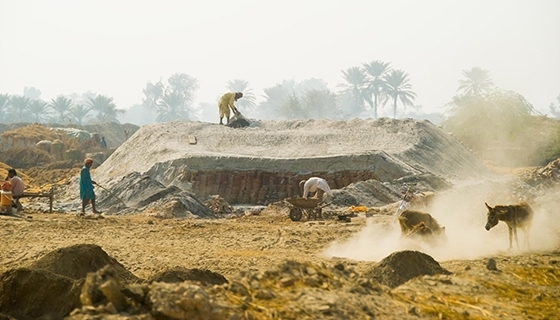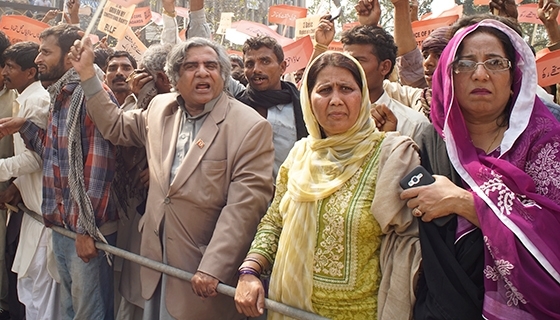Pakistan is one of the world’s biggest producers of bricks, but this achievement comes at an excessively high price: millions of forced laborers, including children, work at the country’s brick kilns from early morning till late night. The local authorities turn a blind eye to bonded labor and few are brave enough to confront this inhumane system. One of these dissenters is Syeda Ghulam Fatima, a recipient of the Clinton Global Citizen Award.
The vicious cycle of debt
About 21 percent of Pakistanis live below the poverty line. In order to make ends meet many are forced to borrow money from owners of brick kilns. These loans have exorbitant interest rates. As a rule, the borrowers have no way of repaying their debts and are thus forced to work at the kilns for pennies. They never earn enough to pay back the loans and the amount they owe keeps growing. This practice, a contemporary form of slavery, was outlawed in Pakistan back in 1992, but millions of the country’s residents still fall into the trap of debt bondage.
If the borrower dies, members of his or her family, including children, are forced to work to pay off the debt.
The new generations are thus also forced into debt slavery. Bonded families are often kept prisoner, unable to leave areas where they work until their debts are paid off. Kiln owners intimidate and punish the workers with sexual and physical violence for any attempt to ascertain their rights. The underage laborers are the most vulnerable: the UN estimates that up to 3.6 million children under 14 years of age are engaged in bonded labor. Child mortality rates are very high due to tuberculosis and stonemason’s disease. The children sustain hand and eye injuries at the kilns, and many of them go blind.

| Syeda Ghulam Fatima during a protest |
The founder and secretary general of the Bounded Labour Liberation Front Pakistan, 48-year-old Syeda Ghulam Fatima feels the pain of the millions of bonded laborers as if it were her own. For many years now, she has been fighting for the rights of modern-day slaves.
Fearless and unstoppable
“I have been witness to torture, extreme poverty, hunger and humiliation to which the girls and women are subjected at the brick kilns. The horrors I saw filled me with resolve to alleviate their plight,” Fatima says. She first learned about the horrors faced by the brick kiln laborers when she was a teenager. Wanting to help, she visited a brick kiln to tell the debtors of their rights. Many family members tried to discourage Syeda from taking such a risk, her mother among them. But her father, a railroad employee and labor union activist Syed Deedar Hussain, supported his daughter’s quest to help the victims.

| Brick production in Pakistan. Photo: CC BY-NC 2.0 Benny Lin: Flickr |
“They had nothing to eat, but I decided to educate them. I taught them in order to make them stronger, to help them get out of debt bondage,” Syeda explains. She once witnessed a kiln owner get violent with one of the people she was trying to help, and the owner decided to put an end to her visits. He assaulted Syeda and shot her.
“Nobody came to my rescue. I was completely helpless. That’s when I decided that I have to do more for these people. They were fully subservient to their owners, and I had to free them,” she remembers.
Since then several attempts have been made on Syeda’s life and she survived numerous beatings that undermined her health. The lives and wellbeing of her family members are also under constant threat. But Syeda remains undaunted. After receiving her Master’s degree in political science from Punjab University, she continued to fight for the rights of bonded laborers in courts and police stations. These attempts often failed because kiln owners had bribed many of those who are supposed to serve the law. Nonetheless, about 80,000 Pakistanis owe their freedom to Syeda.

| Syeda Ghulam Fatima during a protest |
Life-saving knowledge
Slavery is old news in Pakistan, but the fate of brick kiln workers landed in the global limelight only in 2015, when Syeda’s photo appeared on Brandon Stanton’s Humans of New York Facebook page. A short note about Syeda and her organization resonated with the readers and a new wave of publications about labor bondage in Pakistan swept across the world.
As a result, in just a few days people from all over the world donated more than $2.3 million to Syeda’s organization to support its fight against slavery.
Syeda used this money to create a network of Freedom Centers that provide workers with protection and legal advice. In addition, 600 women were able to complete courses and learn a new profession. But the main result of the media hype was forcing the Pakistani government to consider improvements to the legislation and find ways to enforce the existing laws in order to eradicate slavery. Thanks to these efforts, the government of the Punjab Province passed the Women’s Protection Bill and Child Protection Ordinance – a great achievement in itself.

| Brick production near the city of Sialkot, Pakistan. Photo: CC BY-NC 2.0 junaidrao: Flickr |
“Before the government would say: ‘We have no bonded labor, don’t ask us about it and change the name of your organization.’ And now, as a result of my struggle, the same government and the same prime minister are very concerned about child labor bondage at brick kilns,” Syeda says proudly.
Her fight against slavery is further complicated by Pakistan’s high illiteracy rate. Syeda would like to provide her countrymen with education, especially the girls who are rendered completely helpless by the lack of knowledge about their rights. “My dream is to facilitate liberation of people through Freedom Centers. I want to help the victims of bonded labor to get back to their normal lives with the help of education. With education, they will perceive themselves as full-fledged citizens of their country, and they will begin to help others, just like I’m helping them,” Syeda says.
Syeda Ghulam Fatima was a finalist for the inaugural Aurora Prize for Awakening Humanity. On behalf of the survivors of the Armenian Genocide and in gratitude to their saviors, the annual Aurora Prize aims to raise public consciousness about atrocities occurring around the world and reward those working to address these major issues in a real and substantial manner. The Prize is awarded annually on April 24 in Yerevan, Armenia.


